It’s easy to get caught up in our goals for life. Sometimes, we work so hard to achieve our goals because, in the moment of accomplishment, we find peace. But this peace doesn’t last.
In this episode, Spiritual Teacher Gangaji shares her wisdom on how we can reach goals for life and have a sustained sense of peace.
Table of Contents
Key Takeaways
In our culture, often, stopping is heresy because everything says we have to go harder and faster.
The goals are an expression of fulfillment.
Practicing slowing down or stopping:
- Meditation practice, being in nature, or simply having fun are practices that support slowing down.
- The essential support is being willing to ask yourself, “What do I want?”
- The next question is, “What will that give me?”
- These questions are designed to bring your attention back to what is already here.
There’s peace in accomplishment, but it’s not a lasting peace.
Your ultimate goals for life are not something we fabricate in our minds, but it’s something that’s revealed.
The willingness to consider the question “What is the purpose of my life?” is already a deepening of life experience.
This energy we call terror often accompanies the most important moments of our lives.
We have to recognize ourselves as the truth of one being.
If we can listen to each other, we can discover what all beings need for well-being.
Tell the truth about what you want and trust yourself.
Transcript: Goals For Life- Interview with Gangaji
Luis Congdon
Have you been feeling overwhelmed by your goals for life or your to-do list? Is it making you feel like it’s hard to get things done and enjoy life?
On today’s episode, spiritual teacher Gangaji joins us to help guide us into more calmness and stillness so we can enjoy life more and be more present with everything that we do.
Today’s guest joins us with an incredible story of having her successful practices as an acupuncturist, getting a college degree, and living a life of love that was “Successful” but always pervaded with a sense of longing and a desire for fulfillment.
Then, she went to India, found a teacher, and is now someone who is helping others across the world find peace.
In today’s episode, Gangaji, author of The Diamond in Your Pocket, joins us to help you find more peace and a space of stillness.
All right. It’s a pleasure to have Gangaji here on the show today, someone who I deeply admire and whose work has significantly impacted me and my personal life.
Gangaji, are you ready to launch into goals for life?
Gangaji
Oh yes. Thank you. I’m happy to be here.
Luis Congdon
Wonderful.
For a lot of us as entrepreneurs and people who are interested in having a successful life and having it all, one of the traps we can get wrapped up in is this desire of what having it all means and constantly trying to pursue goal after goal after goal, and never feeling fully-nourished.
That’s where your work has blessed me because I come to your work and teachings, and one of the biggest things that you talked about is stopping.
I wanted to dive in with you a little bit about that and how that helps us.
Gangaji
Great.
In our culture, often, stopping is heresy because everything says we have to go and just go harder and faster.
Stop Trying To Get To Your Goals For Life

Gangaji
Stopping was the central teaching that my teacher, Papaji, gave me, and it was so radical. It is still radical that I’m always happy to pass it on.
Luis Congdon
So, what is one of the ways we can stop?
I know that I’m a very driven person. I have a long to-do list, and goals for life, and sometimes my mind is overwhelmed and sometimes very excited also. Sometimes, it’s a blessing, and sometimes, it’s this incredible curse always to be going. Sometimes, it’s wonderful. Sometimes, not.
Even today, I got excited and happy, and I looked forward to today’s interview because I needed to stop, and sometimes, that is such a hard thing to do.
Gangaji
Well, to me, the invitation to stop is to recognize that we can still have all the goals for life we have, but if we are going to the goals for life, that’s very different from coming from fulfillment, and these goals for life are then an expression of that fulfillment.
The invitation to stop is to turn your attention to what is already at peace and fulfilled within you. From that, then, you can live your life.
Of course, many people have no idea what that even means. They would say, “Well, I’m not fulfilled, and if I could just get these goals for life checked off, then maybe, I’ll be closer to fulfillment.” That’s what the conditioning of our society reinforces.
When I say it’s a radical invitation, it demands just an incredible one second of being willing to lose everything. In that, to discover what is here, what is always here, essentially, who you are. And if we aren’t trying to find who we are through the manifestation of our goals for life, then we discover for a moment that it’s here. The fullness, the home, the truth, peace, love, the bounty is already here. From that, then, what a life?
Letting Go Of Your Goals For Life
Gangaji
Yes, I have goals for life, and I appreciate my goals for life. I can even go too fast sometimes and need to physically and mentally stop.
This stopping is a benefit. It’s not a loss. In the willingness to lose, you gain.
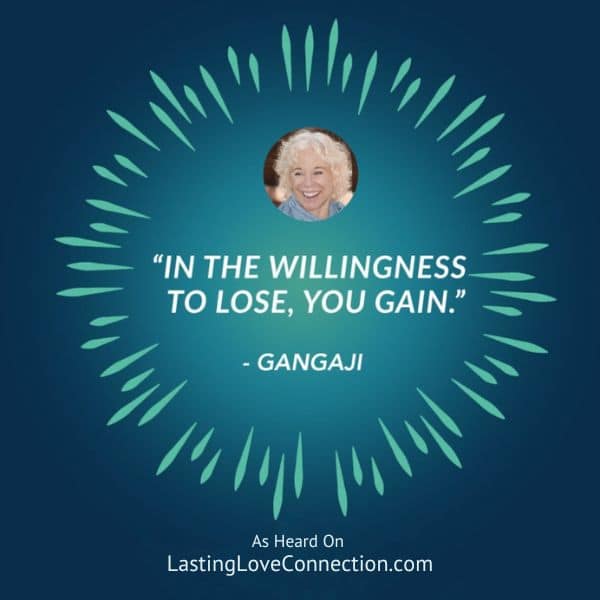
Gangaji
That’s the paradox.
Kamala Chambers
I enjoy the way you laid that out for us and that paradox that is so alive in all of us moment by moment.
One thing I would love to hear from you is how we remember. What is the practice that you recommend to remind ourselves every day as we’re getting wrapped up and as we’re going and going, what do we do to practice this?
Gangaji
Well, that’s a great question, and many methods support slowing down and stopping.
Certainly, those are meditation practices being in nature or simply having fun. It can all be quite supportive, but for me, the essential support is being willing to ask yourself the question, “What do I want?”
The more superficial answer to that question is, “Well, I want to complete this task,” or “I want to make this money,” or “Get this healthy relationship.”
Then, the next question under that is, “What will that give me?” These are questions of inquiry, and when they are asked, “What do I want?” And if I get what I want, what will it give me?” All of these questions are designed to bring your attention back to what is already here.
An Inquiry into Your Goals For Life

Gangaji
The practice for me is a practice of inquiry. It’s an inquiry, not in the academic sense but in the alive sense of questioning yourself. “What am I doing?” In that, you see how you are perhaps overdoing, and you’re trying to get something. If I stop trying to get in this moment, what do I have?
It’s very simple, and you used the word remember. Of course, that’s a challenge. But, since we’re speaking of goals for life in particular, they do have something to do with desire. So, this “What do I want?” is already present. It’s just that it’s become focused on an external goal. Nothing wrong with that, but there’s something deeper than that.
Just simply tell the truth. “What do I finally, absolutely want? Whether this goal is met or not, what do I want? Who am I? What do I have?”
Luis Congdon
Just listening to you ask those questions and doing the work as you’re asking that, I felt myself thinking about some of the goals for life I have.
Get some of our marketing out and grow the show. Do some stuff with our team we need to do, and get some speaking engagements. All these different goals for life ideas, things I have to do and want to do, and achievements that I want.
Earlier today, I was feeling a little stressed. Because there are so many things I want and need to accomplish. Sometimes, there’s not enough time in a whole week.
As I thought about what you’re asking, I thought what I would want is peace.
Gangaji
Yes. Where do you look for that?
Creating Goals For Life For Peace

Luis Congdon
I sometimes find that I get wrapped up, and that’s why Kamala’s question was fantastic because sometimes, I get very wrapped up in thinking that peace is in the accomplishment of the goal.
Gangaji
That’s excellent, Luis.
In that moment of accomplishment, there is peace and fulfillment, but it’s not a lasting peace.
Pretty soon, we start to build up the next goal, and this is, in one critical sense, natural to active and alive human beings who are privileged to be able to pursue goals for life, but if what’s overlooked is this unconditional peace, then all of those accomplishments are finally in vain.
If you recognize this unconditional peace and the achievements are aspects of coming from that peace, then each goal is just another expression of the truth of this life living itself in multiple ways.
Kamala Chambers
It’s true.
I know you’re not saying eradicate goals either.
One way that I thrive most in life is by having a big vision and big dreams I’m working towards, and a lot of entrepreneurs are like that.
What I hear from you is it’s about coming back to that state of peace through all of your days. Not just when you’ve reached that goal after you have that cup of coffee or if you have that hit of brain chemicals you’re looking for.
I love the way you’re presenting it.
What else would you say? What do you think is one of the most important things people need to know about this?
Gangaji
Well, I like how you recognize that I’m not speaking against goals for life. I’m not anti-goal.
I am interested in challenging people to discover what the ultimate goal is. What is the ultimate goal of your life? What is the desire of your life?
The Purpose Of Your Goals For Life
Gangaji
If we just forget about the millions of things, we will have accomplished by the end of our lives, what is it we want our lives to stand for? What are we here for? That’s a goal that is not something we fabricate in our minds, but it’s something that’s revealed. It’s some purpose of what we are here for.
Again, there are levels of depth to the answer to that question. For many people listening, it could be to create a successful business. That’s my goal. But what’s under that? What’s the purpose of building a successful business? What’s the purpose of being a good mother, a good father, or a good friend?
When we get underneath, we can indeed ask the question, “What do I want?” In the sense of “Do I want to wake? Do I want to be free? Do I want to recognize my nature of peace?” And in that, there is such a broadening of life that there’s plenty of room for transitory goals for life. Because the permanent and fixed goals for life have been realized, and there’s plenty of room for both success and failure, which of course, is a part of life.
There are always more goals, but there’s a deeper realization of the ultimate goal of discovering the truth of who you are.

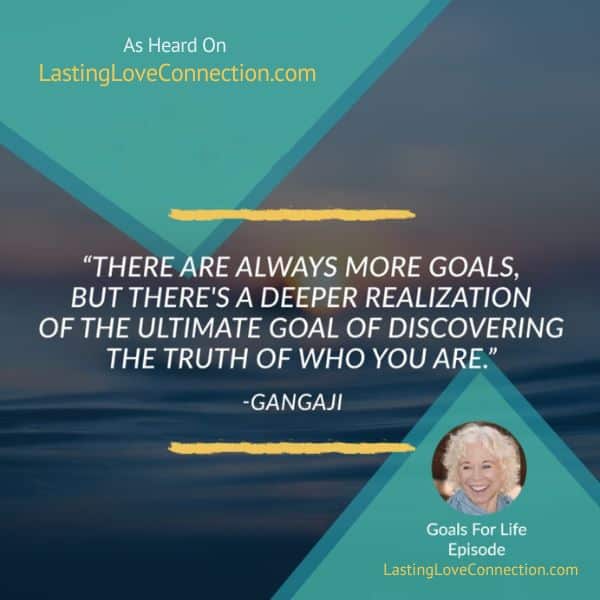
Kamala Chambers
This question is about “What is the purpose of my life?” I think it’s a terrifying question for a lot of people. It’s a scary question because what if you ask that question? What if you take the time to stop and listen for the answer, and nothing comes?
Being Terrified Of Your Goals For Life
Gangaji
Oh, I like this. This is very real.
I like that it’s terrifying because it’s real. It’s not something you can just feed information to. You’re on the spot, then.
Yes, nothing may come, but there is an opening just in the willingness, regardless of the terror.
The willingness to open and consider the question, ‘What is the purpose of my life?’ deepens life experience.
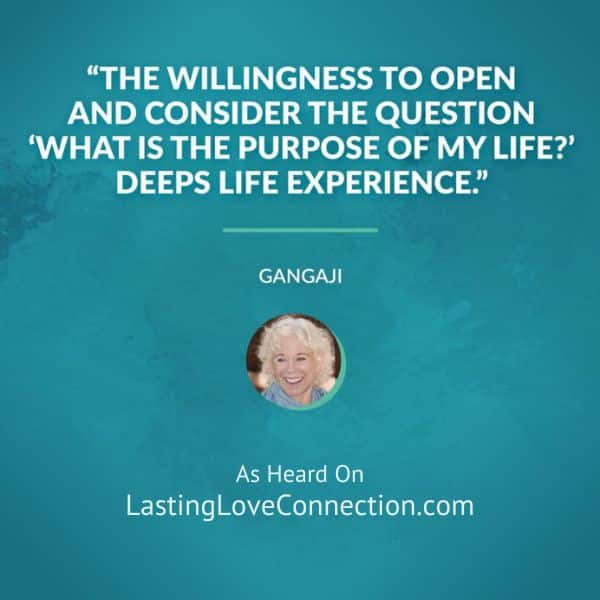

Gangaji
This energy we call terror often accompanies the most important moments of our lives. To fall in love is terrifying too. To have success can be terrifying. To fail can be terrifying.
This terror has to be met, not as something that keeps us from delving very deeply inside but as something that appears or not when we ask these profound questions.
Luis Congdon
That brings me to ask, what do you suggest if we ask these questions and start getting answers like “I’m afraid of failing” or “I’m scared of not reaching that goal.”?
I know when I went very deep into living in an Ashram studying your work, and Papaji and Maharishi and Yogananda, one of the things that came to me was I was very scared of not reaching this ideal of enlightenment.
Gangaji
Yes.
Luis Congdon
For a very long time, I was left with this disappointment that I would never feel the sense of “I know what I’m here for, and I found that peace. Now, I can go and live and be in the world but also feel and know that peace.”
Gangaji
I believe most ancient and current teachings speak of this goal of self-discovery as something in the future or something you have to work to get, something you have to deserve.
Related Reading: 5 Ways An Online Marriage Course Mends Relationships
The Fear Of Not Meeting Your Goals For Life

Gangaji
What I’m inviting you to is something that’s already here and always been here. It’s not a question of whether you’ve earned it have you achieved it, or you can lose it.
It’s only paying attention to what is always here in the midst of all the changes in your life, the failures, the fear of failure, successes, what substance has never left you. This is not new but somehow turning the attention of your mind toward it. It reveals that “Oh yes! I am here. I am aware.”
Then, the feelings come from that as by-products, and they can be a whole range of emotions, including fear.
What I’m trying to say is you don’t have to do it. It’s not like a common goal that you have to accomplish. It recognizes what has already been done from the moment of your birth to the moment consciousness arrived in this form that carries your name, which is always here.
In that, we are humbled because we recognize it’s much bigger than any goal we could imagine, even if we’ve imagined grand spiritual achievements. This is both simpler and deeper than our imagination and as beautiful as our imaginations are. That’s the thrill for me of speaking with people who are willing to tell the truth.
If you are prepared to tell the truth regardless of what you are feeling or your self-judgments, there is a truth to that. This alive consciousness that knows itself and the thinking mind can recognize that and say “Yes” and surrender.
I hope that was clear. I loved your question.
Kamala Chambers
It’s very clear.
Gangaji
Good.
Global Goals For Life

Kamala Chambers
I would like to pull back a little bit from the self and take a moment to ask about a global goal or global mission. We’re in a period where there are a lot of challenges on the planet and do you feel like it feeds into a bigger purpose?
I want to hear about what your perspectives are on the times we’re in.
Gangaji
I think it’s always been rough times if you look through history. I do accept that we’re in very strange and dangerous times. Our democracy is threatened from my point of view.
Yes, it’s a dangerous time, and that can serve to shake us out of our core taking everything for granted. We can recognize how fleeting our privilege is and have forms of relative freedom are.
If that shaking shakes us to the core, then there’s the potential for the creative force to be released, and we can discover what appropriate action is. We can think what has never been thought.
We’re not just talking about forms of government here. We’re talking about the life of the planet. All human beings everywhere are becoming more aware of whichever side of the divide they’re on.
The energy is there if it will be. How will it be spent? I think we will have to discover and each of us can take responsibility for that. How we are spending our individual life energy in our particular place, a minuscule place relatively speaking on the planet and yet, also huge if we recognize we are all connected.
When Buddha would talk about all being awakened, that’s the way Papaji and that each of his meetings may all find peace. May all beings recognize themselves as the truth of one being.
Taking Responsibility For Your Goals For Life
Gangaji
We have to recognize ourselves as the truth of one being.
It is about me. I have to take the responsibility to inquire about what my life is about, where I am looking for my fulfillment, and what is always here, but that willingness to go completely inside is an expression of all points of being in the known universe.
For me, it’s a mystery how it will be used or what will happen. Civilizations have ended. Great governments have stopped. They are usually stopped by reactionary forces internally and externally.
It would not be unique for our civilization to end, but maybe it’s unique that we are aware of how many civilizations have ended, and we’re aware of the fragility of life forms.
Life forms are very fragile. In that, we need each other, and also in that, we have each other.
If we can listen to each other, we can discover what all beings need for well-being
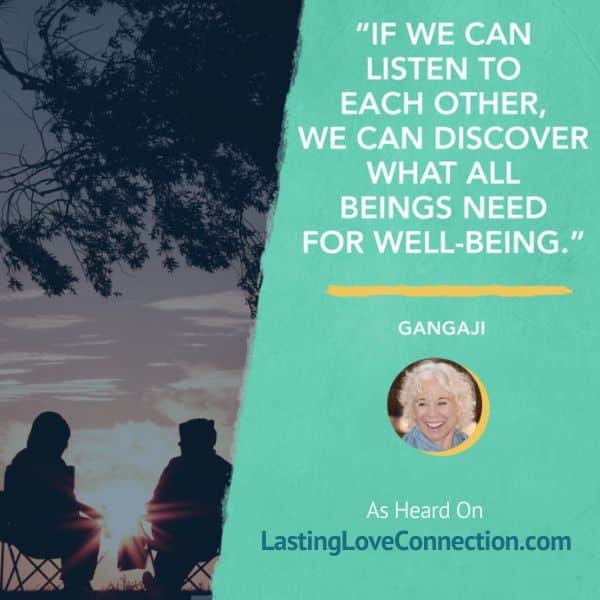
Kamala Chambers
Before we go, is there any last bit of wisdom you want to say?
Trust Yourself To Meet Your Goals For Life
Gangaji
I would say it’s a part of my invitation for you to tell the truth about what you want.
When you are willing to tell the truth about that, and you have a glimpse of the bigness of that, whether you understand it or can put it into words is secondary. Then, the word that I would have around that is to trust that.
Trust yourself at the deepest level. In that trust, open and discover what you want.
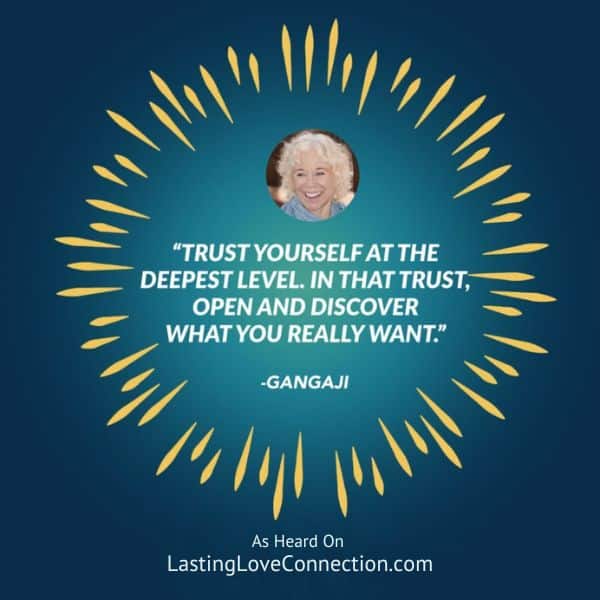
Luis Congdon
That’s a beautiful message about goals for life. Thank you so much for joining us today.
We’ve been here with Gangaji talking about goals for life. It’s been a real pleasure and honor to have you here today.
Thank you so much for joining us, Gangaji.
Gangaji
I’m honored. It was a beautiful conversation about goals for life.
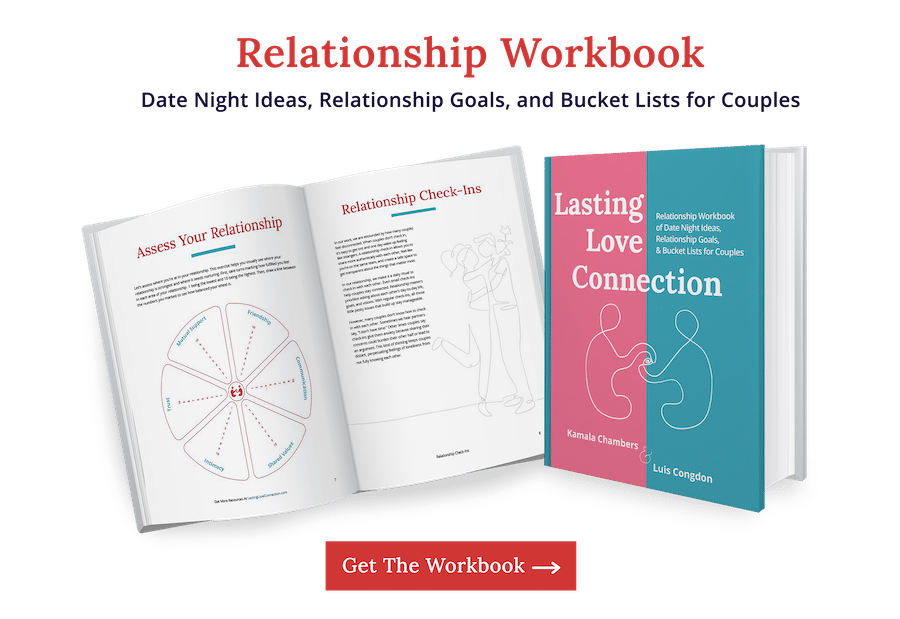






0 Comments